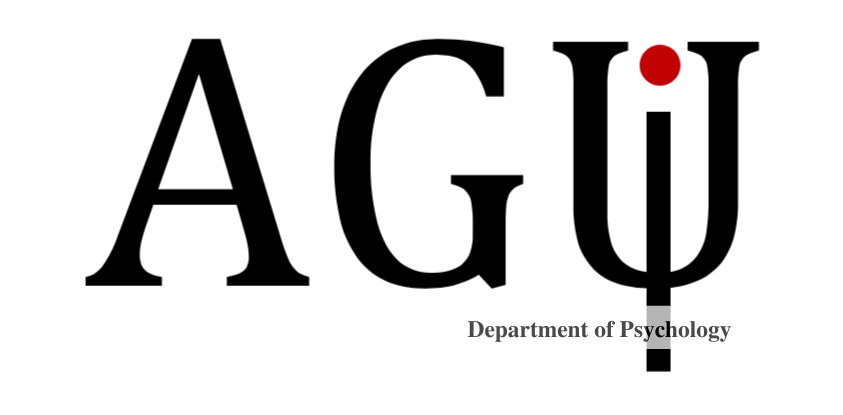History and Logo

AGU Department of Psychology accepted its first students with the university exam organized by OSYM (Measurement, Selection and Placement Centre) in 2020. In this way, a total of 41 students won the AGÜ Psychology Department with the university exam in 2020 (with a quota of 1 school winner). The language of instruction of all departments is 100% English at Abdullah Gül University. They spent the first semester or two semesters in the English preparatory program to prepare effectively for foreign languages. As departmental teachers, we look forward to starting our first department courses with our students in the fall semester of 2021-2022. AGU Psychology Department, currently (As of December 2021), consists of three full-time doctoral faculty members and three research assistants, and it will continue to expand in the coming years.
The letter “Ψ,” which means psi in the Greek alphabet, is used worldwide to symbolize the science of psychology. While designing a logo to represent AGU Psychology Department, we thought about starting from the “psi” symbol and the AGU logo. Thus, a design appeared, according to which we believe that the logo on the picture can represent our department. Dear students, you can use this logo on the cover pages of your assignments and possible presentations of your works by reducing and placing it in the upper right corners of your PowerPoint presentations.
Educational Approach
Psychology science, which produces systematic knowledge of the human mind and experiences, is one of the most popular fields of science, gaining more and more importance both in Turkey and globally. However, one of the fundamental sciences, psychology, is not yet recognized accurately and realistically in Turkey as in many countries. Therefore, AGU Psychology is not only a department that shares the information produced in the university but also aims to produce technologies that contribute to human well-being by spreading to the community and carrying out partnerships with various people, groups, and institutions in the society.
AGU Psychology conducts research that includes systematic observation, understanding and interpretation of the mind. Therefore, AGU Psychology does not provide ideas based on insights into human thoughts, feelings and behaviours. It provides information and information production methods for the functioning of the human experience and mind acquired through experimentation and systematic observations. With the research carried out together with classroom courses, application laboratories and faculty members, AGU Psychology students can discover intellectual perspectives and etiquette methods that they can express in various essential areas of psychology.
In the global context of the 21st century, AGU Psychology aims to train world-integrated psychologists equipped with the knowledge and skills needed by the business, art, industrial and social life. For this reason, for the first time in Turkey, the AGU Psychology program offers the “Flexible and Dynamic Learning Model”, which adopts a critical pedagogical approach as a teaching model. AGU Psychology adapts eight primary program objectives and nine essential skill acquisition and learning outcomes related to these objectives through this approach. These objectives are Knowledge Base, Research Methods, Quantitative Literacy, Critical Thinking, Interaction and Communication Skills –Written &Oral, Information and Technological Literacy, Technology Innovations to Human Well-being and Values in Psychology. Situated in the centre of this goal, they are the fundamental skills and knowledge that should be gained during undergraduate psychology education according to the Turkish Psychological Association and the European Federation of Psychology Association (EFPA) and the American Psychological Association (APA).
In addition to its innovative pedagogical approach, AGU Psychology Department aims to bring another critical innovation to psychology in Turkey. Unlike other psychology programs, it adopts the “Psychological Innovation and Impact to Social Problems (PIISP) within the curriculum. With SPPIE, AGU Psychology Department aims to go beyond some undergraduate programs that merely prioritize teaching theoretical knowledge of psychology. However, it provides opportunities to their students to design projects under the guidance of non-governmental organizations, educational and healthcare institutions, municipalities, trade associations, small and medium enterprises holdings with various public and private institutions, and some international non-profit organizations. Students who want to participate in these projects can get “Non-AGU Project” or “Independent Study” courses included in their undergraduate curriculum. AGU Psychology aims to equip future psychologists with the basics of psychological science and train young psychologists who can apply this knowledge in solving the challenges of social life and build their career plans and post-graduation visions during their university years.
AGU Psychology Department, established recently, uses the EDOM method for undergraduate and postgraduate education programs and their development and growth. In other words, AGU psychology is not a department that prioritizes quota increases based on parameters like buildings’ infrastructures. Instead, it centralizes qualified development and flexible expansion plans based on the Intelligent Development Score, measured by the analysis of data collected by the department itself. Hence it aims to grow to become one of the global actors of the 21st century. In this direction, including representatives from the Dean of Students and the Faculty of Educational Sciences, the commission focuses on joint work with the accreditation boards of national and international psychology organizations and the Higher Education Institution to increase the number of students and the courses department offers, laboratory facilities, faculty members and expand the research capacity.
